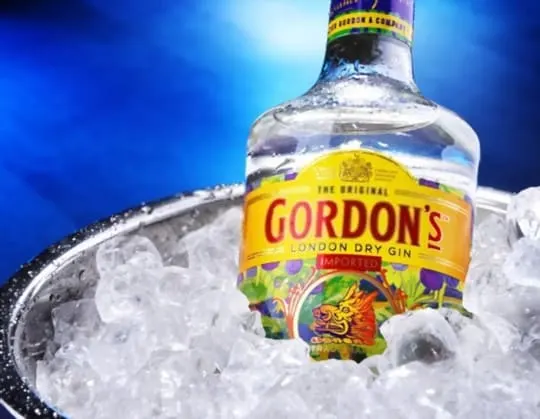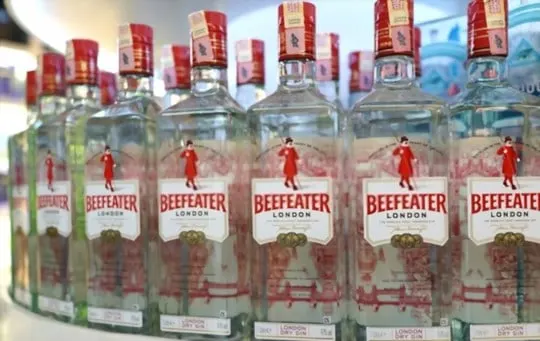Gin. It’s the spirit that makes us feel like we’re having a sophisticated soirée, even if we’re just in our PJs. Dry gin and regular gin– these are the contenders.
One’s like your classy, know-it-all friend. The other? A fun-loving pal. We’ve danced with both at parties.
What sets them apart, really? It’s all in the flavor profile. Dry gin? Less sweet, more herbal. Regular gin? It’s got that juniper punch, with a bit of sweetness.
Our taste tests can get, well, lively. Ever tried a blind tasting at a house party? It’s a game changer.
So, which do we reach for on a Friday night? Read on and find out.

What is Dry Gin?

Dry gin is a type of gin that has little to no added sugar or flavorings.
It is distilled from a base of neutral grain spirits and botanicals, which can include juniper berries, coriander seeds and angelica root.
The absence of any sweetness in dry gin gives it a sharper taste than its counterpart, regular gin.
Dry gin gained popularity during the 19th century in England where it was used as a mixer for cocktails or sipped alone.
When comparing dry gin to other types of gin, such as regular or sweetened varieties, it is important to note that each has its own unique flavor profile.
Regular gin typically has additional flavors and a sweeter taste due to the addition of sugar while sweetened gin contains even more sugars and flavors making it less versatile for mixing with other ingredients.
On the other hand, dry gin is the preferred choice among bartenders because it blends well with various cocktail mixes without compromising its distinct taste.
To add to the uniqueness of dry gin, there are different types available on the market such as London Dry Gin or Plymouth Gin which are both variations distilled in their respective regions.
Ultimately, the preference between regular and dry gins varies based on individual taste preferences but for those who opt for minimal sweetness and versatile usage options, dry gin may be the better option.
What is Gin?

Gin is a type of alcoholic beverage that falls under the category of spirits.
Its predominant flavor is derived from juniper berries.
Its manufacturing process involves infusing a neutral spirit with aromatic botanicals such as coriander seeds, angelica root, citrus peels, orris root, and cardamom pods.
The amount and combination of these botanicals vary from brand to brand, making each gin unique in taste and aroma.
Gin has two main types: dry gin and gin liqueur.
Dry gin is made by distilling botanicals with neutral grain spirits to produce a high-proof base spirit before adding water to dilute it, while gin liqueur contains added sugars which make it sweeter.
The choice between the two mainly depends on personal preference and usage.
Dry gin is best suited for cocktails that require a more intense flavor profile since it does not contain any added sugars.
On the other hand, gin liqueurs are recommended for those who want to consume it neat or add it in desserts.
It’s worth noting that different brands have varying alcohol content that comes in four different strengths; 37.
5%, 40%, 43%, and overproof which range between 57% to over 60% alcohol content.
It is important to drink responsibly and avoid overconsumption of alcohol for health reasons when consuming Gin regardless of the brand or type one opts for.
Differences Between Dry Gin and Gin

Comprehending the nuances between Dry Gin and Gin can be tricky for a novice.
While both have Juniper Berries as their essential component, Dry Gin predominantly owes its name to its production method.
Distilled with little or no added sugar; it delivers a lemon or floral flavor profile.
In contrast, regular Gin is sweeter and has flavors of citrus and juniper.
When it comes to the complexity of botanicals in these two types of gin, both stay even-handed except for Sugar content.
Sugary sweetness makes regular gin more palatable to drinkers not used to unsweetened spirits; conversely, Dry Gin favors a more sophisticated palate that savors juniper Berry’s distinctive flavor minus any other abrupt sweetness interventions.
Lastly, It’s noteworthy that Dry Gin has been around longer than regular gin outside India.
British explorer Sir Stamford Raffles discovered this spirit on his travels across Asia in early 1819.
Revered for its unique refinement and minerality appeal – it was initially consumed as an apothecary concentrate till it acquired commercial fame in popular cocktails like Martini and Tom Collins later in the 1900s era.
In summary, there is no clear winner between Dry Gin and Regular gin- It merely depends on what appeals to your taste buds.
Ingredients and Production Process
The creation process and ingredient selection are significant factors that can affect the overall quality of gin.
Gin is a distilled spirit that must contain juniper as its predominant flavor, but other botanicals can also be used to create unique blends and flavors.
The production process is typically a two-step process where the alcohol is first distilled with the herbs and botanicals, then diluted to bottle strength.
Different types of gin exist in the market, with dry gin and regular gin being two primary categories.
Dry gins are typically made using a more complex recipe of botanicals, resulting in a flavorful yet smooth taste profile.
On the other hand, regular gins may have additional sweeteners added to them after distillation, resulting in a sweeter and less herbal taste compared to dry gins.
One essential factor when choosing between dry gin vs gin is personal preference regarding taste preferences.
Those who prefer a sharper, herbaceous flavor may lean towards dry gin, while those who prefer something sweeter may prefer standard gins.
Another factor that influences this decision is the intended drink’s purpose; some cocktails or mixed drinks tend to require one type of gin over another.
Flavor Profile and Aroma
The Distinctive Flavors and Scents of Dry Gin vs Gin.
Gin and dry gin, though similar in many aspects, still differ significantly in terms of their flavor profile and aroma.
Gin has a bold juniper taste that provides a distinct pine-like flavor with undertones of citrus.
On the other hand, dry gin contains fewer botanicals, leading to a cleaner taste and subtle nuances of lemon zest or grapefruit.
When it comes to aroma, London Dry gin has a balanced scent due to its neutral spirit base.
It includes botanicals such as cardamom, coriander, and angelica root, giving it an earthy fragrance with a hint of spice.
In contrast, gin commonly employs floral and fruit additions such as rose petals or cucumber slices.
This infusion gives it a more aromatic character that is light and refreshing on the nose.
One unique aspect separating these two spirits is their production process.
Dry gins go through multiple distillations to remove impurities and create the clear mellow liquid commonly used in cocktails today.
Conversely, gins do not undergo this repeated distillation process before being bottled, thus retaining a murky coloration.
Uses and Mixing Options
When it comes to the versatility of drinks, choosing between different types of gins can be quite daunting.
Each gin has its own unique flavors and mixing options that cater to your preferences.
Knowing which type of gin to use is crucial in making cocktails as it heavily influences the overall taste and aroma of the drink.
As for their uses and mixing options, dry gin and gin differ in many ways.
Dry gin is best used in classic cocktails such as Martini, while more modern cocktails like Negroni use traditional gin.
However, both types can be interchanged based on personal preferences.
Aside from classic cocktails, dry gin is also a great addition in cooking to give a boost in flavor for dishes like lamb or even salad dressings.
Meanwhile, traditional gin with its mixability makes it a versatile spirit that works with almost any cocktail recipe.
Although both gins have overlapping features in terms of uses and mixing options, dry gin has a sharper herbal flavor while traditional gin offers more juniper notes.
At the end of the day, it all boils down to what your taste buds crave at that moment.
Experimentation is always key when discovering new combinations or trying out a twist on old favorites.
Similarities Between Dry Gin and Gin

Dry Gin and Gin share some commonalities in terms of basic ingredients and processes.
Both use juniper berries to provide the signature gin flavor and undergo a distillation process to extract its spirit.
Additionally, both can be enjoyed on their own or used in cocktails to provide added flavor and depth.
While there are nuances that set them apart, it’s clear that they both offer unique taste experiences that can suit any preference.
Moving on from the similarities, it’s worth noting that the final product of Dry Gin is typically more “dry” than regular gin due to a longer steeping process with additional herbs and botanicals added for flavor.
As such, when compared to regular gin, dry gin has a more subdued taste which may appeal to those who prefer a less overpowering taste profile.
Popular Brands of Dry Gin and Gin
Several popular brands of both dry gin and gin exist on the market.
Hendrick’s, Tanqueray, Bombay Sapphire, and Beefeater are beloved options for regular gin lovers.
For those who prefer dry gin, options such as Monkey 47, Gunpowder, Sipsmith London Dry Gin as well as Plymouth Original Strength are available.
When it comes to flavor notes, juniper is typically the dominant note in traditional gins.
However, sloe gin might also have added ingredients like blackthorn berries that give a fruity flavor.
As for dry gin, it usually contains less sugar than traditional gin and has more spice notes like cardamom or cinnamon without having any additional flavors beyond juniper.
Overall Dry Gin vs Gin – each variety has unique pros and cons depending on individual preferences and tastes.
Hence choosing what works best depends on the personal preference on feelings it creates while drinking it compared to its price range.
Conclusion
After analyzing the properties of both dry gin and gin, it can be concluded that the choice between them largely depends on individual taste preferences.
Both variations have a unique set of features that make them stand out in their own way.
While dry gin provides more room for experimentation with different cocktail recipes, gin’s sweetness appeals to those who prefer fruity beverages.
Ultimately, it boils down to personal preferences in terms of taste.
It is important to note that while choosing either variation over the other doesn’t necessarily determine the quality of your drink, it does play a vital role in determining how balanced and enjoyable it will be.
Hence, one should select the variation based on what suits them best rather than trying to conform to any specific definition or classification.

Leave a comment